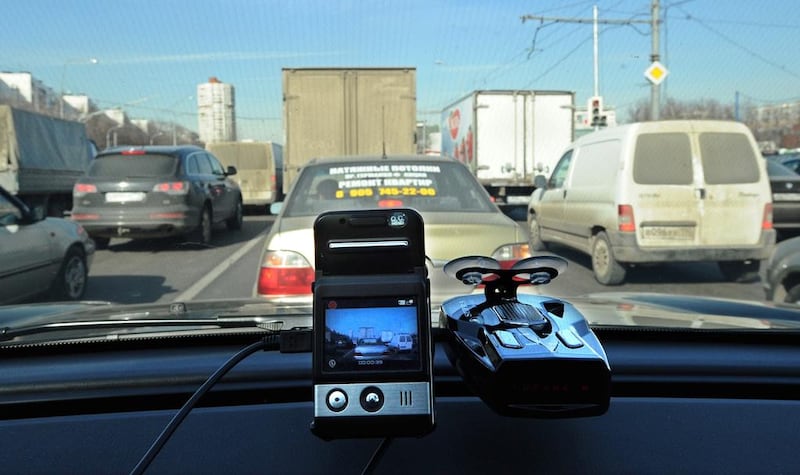ABU DHABI // Cameras mounted on the dashboard of motor vehicles can act as vital tools for evidence gathering in road accidents, but privacy laws mean residents must think twice about using them.
Al Ain resident Ibrahim Ahmed bought one of the devices in the UK, where they are becoming increasingly popular, but has yet to install it.
He believes dashcams could help in avoiding problems from road accidents, such as aggression from other drivers.
“I believe they can reduce a lot of the legal potholes and costs, and contribute positively to the justice system,” he said.
“In the absence of a witness things can be complicated and if someone is injured it could mean jail time until an investigation has concluded.
“Even if no one is hurt, there is still the blame game.”
The reason Mr Ahmed has not yet installed his new device is he is not sure about the legality of using it.
While the devices are extremely popular in Russia, a country with a high rate of road fatalities and poor law enforcement, they are not so welcome in other countries.
In a 2013 case that made international headlines, video footage shot by an Indian national was posted online. It showed an Emirati man assaulting an Indian driver with his agal and punching him after a road accident in Dubai.
After uploading the video, which went viral on YouTube, the Indian was charged with defamation, even as the Emirati was charged with assault.
All charges were subsequently dropped but the case highlighted the country’s privacy laws, and how residents could find themselves in legal limbo by not knowing the rules.
Technically speaking, video recordings and still photography of certain areas are illegal and consent must be given before people are filmed or photographed in public.
Lawyers have noted that taking photos in restricted areas can result in a jail term of one to three months and fines of up to Dh5,000.
While Dubai Police have encouraged residents to submit images of criminal behaviour and traffic infractions, they have also warned against posting such information on social network sites.
Lawyer Amer Al Marzouqi said any video footage taken from a dashcam would not be considered valid evidence before the courts.
“Dashcams are restricted in the UAE and cannot be installed in private cars, since they record the areas, roads and people who might not desire to be recorded by other people or the Government,” Mr Al Marzouqi said. “Evidence has to be produced in a legal manner.”
Thomas Edelmann, founder of Road Safety UAE, thinks dashcams can play a role in enforcing the law and resolving disputes in accidents.
“If you look at some other countries, they do allow dashboard cameras and this is for insurance purposes,” Mr Edelmann said.
“It is allowed and it is encouraged. Dashcams could provide evidence of what happened. They could also help police.”
Mr Ahmed said he was always aware that the UAE’s roads, though increasingly safer, were still the scene of excessive speeding, tailgating and aggressive driving.
There were also careless habits such as texting and talking while driving to consider.
“The Government is working extremely hard to combat this but I think it will take time to change the driving culture in the whole region,” he said.
“I like to consider myself a safe and honest driver. A dashcam would be added protection.”
Security Media did not respond to questions about the devices’ legality.
esamolgou@thenational.ae






